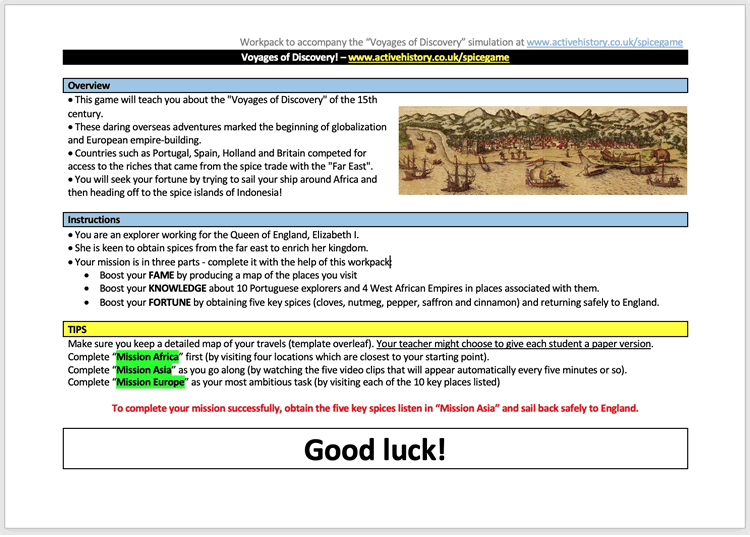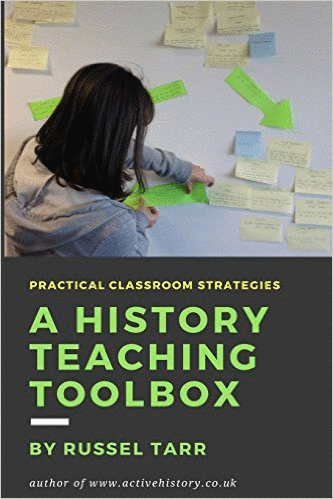World History teaching resources for the high school classroom: lesson plans, worksheets, quizzes and simulation games for KS3, IGCSE, IB and A-Level teachers.
 Voyages of Discovery - Online Simulation Game
Voyages of Discovery - Online Simulation Game
Overview
This simulation introduces students to the Voyages of Discovery. These daring overseas adventures marked the beginning of globalization and European empire-building. It incorporates a number of useful video clips.
By playing the game students will learn about some of the most important explorers, their discoveries, and the spices which they brought back to Europe.
The main aim of the game is to find your way to the Spice Islands in the Far East. There are several key islands, each with a different spice (cloves, nutmeg, pepper, sandalwood and cinnamon). Obtain each of these, then sail back home to England to complete your mission.
Suggested Lesson Plan
The simulation could be set as a homework exercise, but I prefer playing it in classroom time over several lessons (students can 'save progress' at the end of each session so they can pick up where they left off). It contains a wealth of information to keep them busy for several hours, although you could direct students to complete particular tasks if you have less time.
Read the introductory screen to the whole class and stress that they will need to provide their name for the 'leaderboard' (which serves the same purpose as a live markbook).
Bring up a copy of the student worksheet on the screen and draw their attention to:
1. The outline map. They should make sure they plot their progress on this with details of the places they discover. This will be invaluable to help them find their way around.
2. Mission "Asia" - the video task. Stress that at regular intervals of 5 minutes or so, a fresh video clip will be presented to them (there are five of these, one for each of the five main spices) and that these will need to be watched in order to complete the worksheet.
3. Mission "Europe" - the explorers task. 10 key locations (highlighted in green on the teacher version of the map) will contain information about explorers and their discoveries. These should be used to complete this part of the worksheet.
4. Mission "Africa" - the empires task. Four key empires in West Africa will be outlined and students will need to answer structured questions about them.
From my experience, it is a good idea to allow students one lesson to simply focus on the mapping and the video notes, and another lesson or homework to play again with particular focus on the "explorers" task.

How to complete the game
Although you should try to avoid giving too much away, if students start to get frustrated or need some assistance, you can obtain detailed Teacher Notes which explains clearly how to finish the game, as well as completed answers to the main tasks.
I like to bring up the teacher version of the map onto the whiteboard halfway through the available time I'm willing to give it (which is usually two hours), and give them some tips on what they need to get and how they need to complete the mission. I then award a prize (a nutmeg!) to the first student to complete the mission successfully (or, failing that, the person who gets the best overall score on the leaderboard).
Follow-up tasks
After sufficient time has been given to students to play the simulation and complete at least a proportion of the worksheet, they should proceed to the follow-up classroom project, which takes the form of an open-ended 'choose your own markscheme / homework'.
Revision / End of Unit Quizzes
Proceed to the Simulation

© 1998-2026 Russel Tarr, ActiveHistory.co.uk Limited (Reg. 6111680)
1 Torrin Drive, Shrewsbury, Shropshire, SY3 6AW, England
Privacy Policy | Contact







